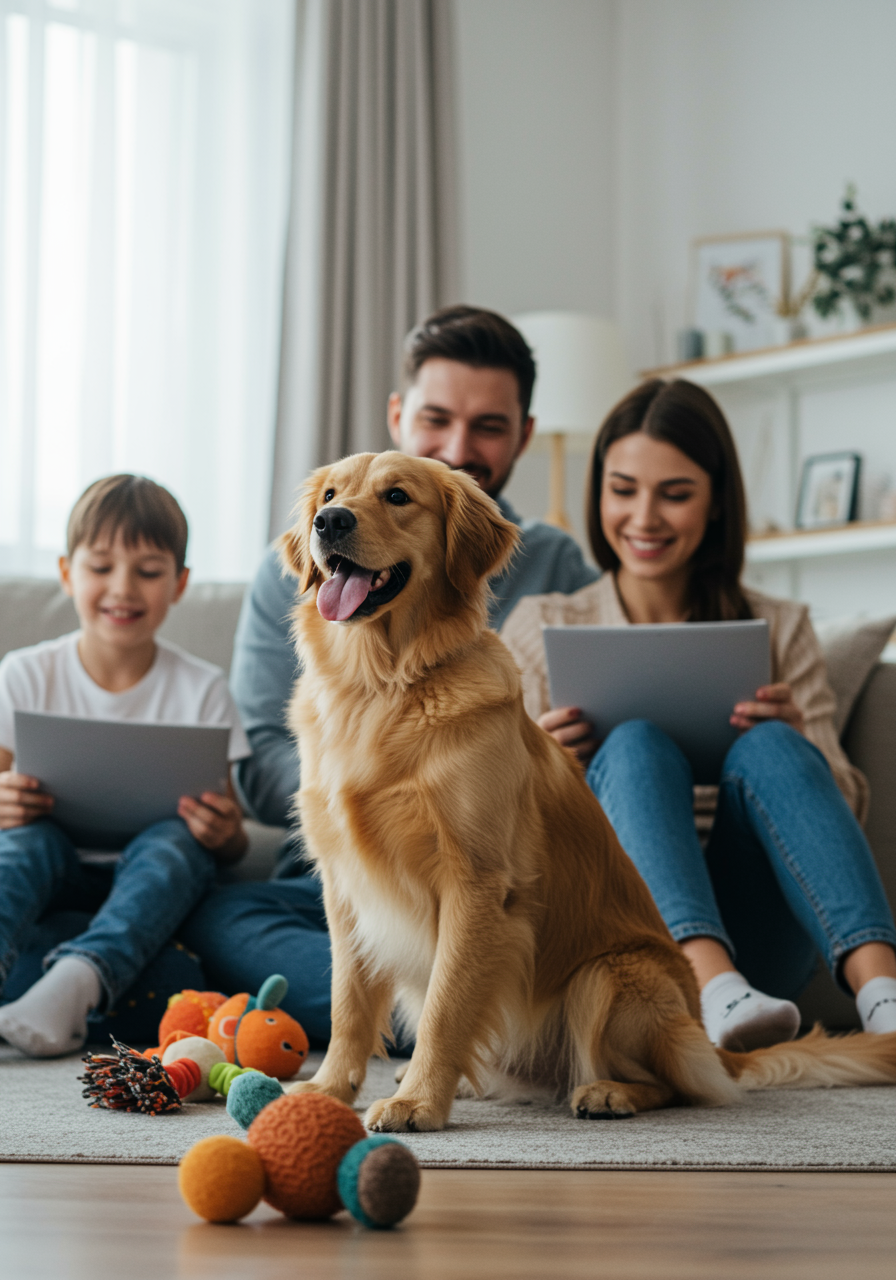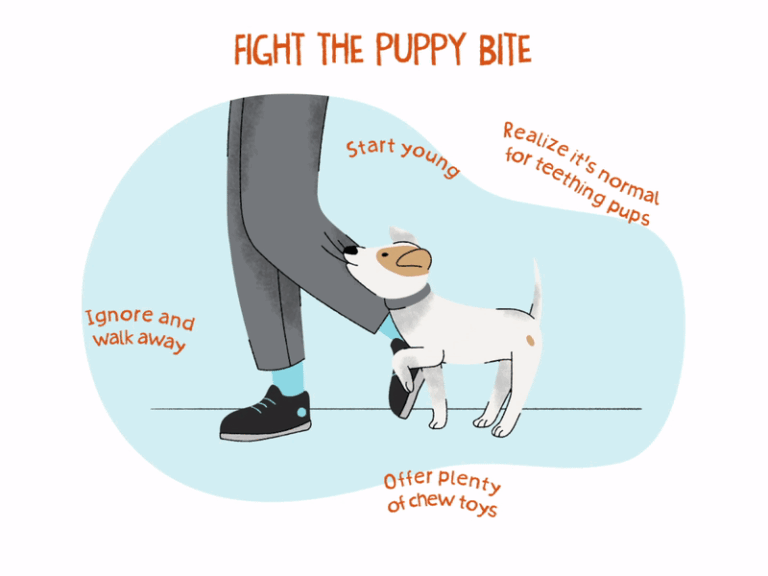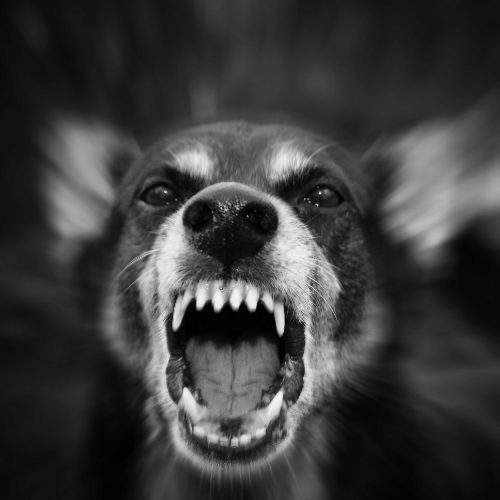How to Train a Dog to Stop Biting: A Complete Guide for Dog Owners
Every dog owner knows that moment when their adorable puppy or beloved adult dog decides to use their teeth a little too enthusiastically during playtime. Whether it’s a gentle nip that catches you off guard or more serious biting behavior that has you concerned, you’re not alone in wondering how to address this common challenge. The good news? With patience, consistency, and the right approach, you can successfully train your dog to stop biting and develop what experts call “bite inhibition” – the ability to control the force of their bite.
Biting is actually a completely natural behavior for dogs. From the moment they’re born, puppies use their mouths to explore the world around them, play with their littermates, and communicate with their mother. However, what’s acceptable in the dog world doesn’t always translate well to life with humans. That’s where proper training comes in, helping your furry friend understand appropriate behavior while strengthening the bond between you both.
In this comprehensive guide, we’ll walk you through everything you need to know about stopping biting behavior, from understanding why dogs bite in the first place to implementing proven training techniques that work for both puppies and adult dogs. Whether you’re dealing with playful puppy nips or more concerning aggressive behavior, you’ll find practical, actionable advice that you can start using today.
Understanding Why Dogs Bite: The Foundation of Effective Training
Before diving into training techniques, it’s crucial to understand the various reasons why dogs use their teeth. Unlike humans, dogs don’t have hands to explore and interact with their environment, so their mouths serve multiple purposes. Recognizing the motivation behind your dog’s biting behavior will help you choose the most effective training approach.
Puppy Teething and Natural Development
For young puppies, biting and nipping are completely normal parts of development. Puppies typically start teething around 3-4 months of age, and this process can continue until they’re about 6 months old. During this time, their gums may be sore and uncomfortable, making them more likely to chew and bite everything in sight – including your hands and feet.
Puppies also learn bite inhibition through play with their littermates and mother. When a puppy bites too hard during play, their sibling will yelp and stop playing, teaching the biting puppy that hard bites end the fun. This natural learning process is essential for developing proper mouth control.
Dr. Patricia McConnell, Certified Applied Animal Behaviorist: “Bite inhibition is one of the most important things a puppy can learn. A dog who has learned to inhibit the force of his bite will rarely cause serious injury even if he does bite as an adult. This is why it’s so important not to completely suppress all mouthing behavior in puppies, but rather to teach them to be gentle.”
Play Behavior and Excitement
Many dogs, especially younger ones, get overly excited during play sessions and resort to using their teeth. This type of play biting isn’t aggressive – it’s simply their way of engaging with you the same way they would with another dog. However, what feels like gentle play to your dog can be uncomfortable or even painful for humans.
Dogs who engage in play biting often display relaxed body language: wagging tails, play bows, and bouncy movements. Understanding the difference between play biting and aggressive biting is crucial for applying the right training techniques.
Fear, Anxiety, and Defensive Biting
Sometimes dogs bite because they feel threatened, scared, or cornered. This defensive biting is their way of creating distance when they can’t escape a situation that makes them uncomfortable. Signs of fear-based biting include tucked tails, flattened ears, whale eyes (showing the whites of their eyes), and tense body posture.
Resource guarding is another form of defensive biting where dogs protect their food, toys, or favorite spots from perceived threats. This behavior requires careful management and often benefits from professional guidance.
Cesar Millan, Dog Behaviorist: “A dog’s bite is their last resort. Before a dog bites, they will usually show multiple warning signs through their body language. Learning to read these signals is key to preventing bites and addressing the underlying emotional state that’s causing the behavior.”
Attention-Seeking Behavior
Some dogs learn that biting gets them immediate attention from their owners – even if it’s negative attention. If your dog has discovered that a gentle nip makes you jump up and engage with them, they may continue this behavior as a reliable way to get your focus.
 Essential Training Techniques: Building Bite Inhibition
Essential Training Techniques: Building Bite Inhibition
Now that we understand why dogs bite, let’s explore proven techniques for teaching your dog appropriate mouth behavior. The key to successful bite inhibition training lies in consistency, patience, and positive reinforcement.
The “Ouch” Method: Teaching Bite Pressure Awareness
One of the most effective techniques for puppy bite training mimics the natural feedback they would receive from their littermates. When your puppy bites you, even gently, immediately say “Ouch!” in a high-pitched voice and stop all interaction. This teaches your puppy that teeth on human skin end playtime.
Here’s how to implement this technique:
Start by allowing gentle mouthing but react immediately to any pressure from their teeth. Say “Ouch!” and become completely still – stop moving your hands, avoid eye contact, and don’t speak. Wait for your puppy to release their grip, then immediately praise them and resume play. If they continue to bite or become more excited by your reaction, calmly leave the area for 30-60 seconds.
As your puppy learns that even gentle pressure ends playtime, you can gradually become more sensitive to lighter and lighter contact. Eventually, your dog will learn that any teeth-to-skin contact is unacceptable.
Redirection: Giving Your Dog Appropriate Outlets
Rather than simply telling your dog what not to do, redirection teaches them what they should do instead. Keep appropriate chew toys readily available during play sessions, and the moment your dog starts to mouth your hands, immediately offer them a toy instead.
Choose toys that are different in texture and size from your hands – rope toys, rubber chew toys, and puzzle toys work well. When your dog takes the toy instead of your hand, praise them enthusiastically and engage in appropriate play with the toy.
Victoria Stilwell, Dog Trainer and TV Host: “Redirection is one of the most powerful tools in dog training. Instead of just saying ‘no’ to unwanted behavior, we give dogs a clear alternative that meets their needs in an appropriate way. This sets them up for success rather than confusion.”
Time-Outs: Natural Consequences for Inappropriate Behavior
When other techniques aren’t working, brief time-outs can be very effective. If your dog continues to bite despite your efforts to redirect them, calmly and quietly remove them from the situation. This isn’t punishment – it’s simply a natural consequence that communicates “biting ends social interaction.”
For time-outs to be effective, they should be brief (30-60 seconds), calm, and immediate. Don’t drag this out or make it dramatic. Simply remove your dog to a quiet, safe space where they can calm down, then try again.
The Hand-Feeding Exercise: Building Gentle Mouth Behavior
Hand-feeding exercises are excellent for teaching dogs to use their mouths gently around human hands. Start by holding a treat in your closed fist and let your dog investigate. Only open your hand and give them the treat when they’re being calm and gentle – no pawing, jumping, or biting at your hand.
Gradually progress to holding treats between your fingers, rewarding your dog only when they take the treat gently. This exercise teaches your dog that good things come to those who use their mouths softly around human hands.
Age-Specific Training Approaches
While the basic principles of bite inhibition training remain the same, the approach may need to be modified based on your dog’s age and development stage.
Puppy Training (8 weeks – 6 months)
For young puppies, the focus should be on teaching bite inhibition rather than completely eliminating all mouthing behavior. Puppies need to learn to control the pressure of their bite before they learn to stop using their mouths entirely.
Start with the “ouch” method, but be patient – puppies have limited impulse control and will need many repetitions to understand the lesson. Ensure your puppy gets plenty of appropriate outlets for their mouthing behavior through puzzle toys, frozen Kong toys, and supervised chew sessions.
Socialization during this critical period is also essential. Well-supervised puppy classes allow your pup to continue learning bite inhibition from other puppies while building confidence and social skills.
Dr. Ian Dunbar, Veterinarian and Animal Behaviorist: “The most important thing to teach a puppy is bite inhibition. Even if a dog with good bite inhibition does bite as an adult, the resulting damage will be minimal. This is why puppy classes and appropriate puppy play are so crucial during the first few months of life.”
Adolescent Dogs (6 months – 2 years)
Teenage dogs may test boundaries and revert to mouthy behavior, especially during periods of high excitement or stress. Consistency is key during this phase – don’t let behaviors slide that you’ve previously worked to eliminate.
Adolescent dogs often benefit from increased mental stimulation and physical exercise to help manage their energy levels. Interactive puzzle toys, training sessions, and appropriate physical outlets can reduce the likelihood of problematic biting behavior.
Adult Dog Training (2+ years)
Adult dogs who haven’t learned proper bite inhibition require a more structured approach. If you’re dealing with an adult dog who bites, it’s important to first rule out any medical issues that might be causing discomfort or behavioral changes.
For adult dogs, the training process may take longer, but the same principles apply. Focus on consistency, clear communication, and positive reinforcement. Adult dogs with serious biting issues may benefit from working with a professional dog trainer or behaviorist.
Common Mistakes to Avoid in Bite Training
Even well-intentioned dog owners can inadvertently make biting problems worse. Here are some common mistakes to avoid during your training journey.
Using Physical Punishment
Never hit, slap, or physically punish your dog for biting. This can escalate the situation, increase fear and anxiety, and may actually make biting behavior worse. Physical punishment can also damage the trust between you and your dog, making future training more difficult.
Some people recommend techniques like alpha rolls or scruff shakes, but these methods are based on outdated theories about dog behavior and can be dangerous, especially with dogs who are already showing aggressive tendencies.
Inconsistent Responses
Consistency is crucial for successful bite inhibition training. If you sometimes allow gentle mouthing and other times react negatively to the same behavior, your dog will become confused about what’s expected. Make sure all family members are on the same page about how to respond to biting behavior.
Karen Pryor, Animal Training Pioneer: “Consistency in training isn’t just helpful – it’s essential. Dogs learn through repetition and clear patterns. When we’re inconsistent with our responses, we actually slow down the learning process and create confusion for our dogs.”
Encouraging Rough Play
Avoid games that encourage your dog to use their teeth on you, such as wrestling with your hands or playing tug-of-war with clothing. While these activities might seem fun, they can blur the lines between appropriate and inappropriate use of teeth.
Instead, engage in games that don’t involve teeth-to-skin contact, such as fetch, structured tug games with appropriate toys, or training exercises that challenge your dog mentally.
Waiting Too Long to Address the Behavior
Many dog owners hope that biting behavior will resolve itself as their dog matures, but without proper training, dogs often carry these habits into adulthood. The earlier you address biting behavior, the easier it is to modify.
Advanced Training Techniques for Persistent Cases
For dogs who don’t respond well to basic bite inhibition training, more advanced techniques may be necessary. These methods should be implemented with patience and consistency, and professional guidance may be helpful.
Impulse Control Exercises
Teaching your dog general impulse control can significantly improve their ability to manage their biting behavior. Exercises like “wait” before meals, “stay” during exciting situations, and “leave it” when they want something can all help build the self-control needed for bite inhibition.
Start with simple exercises and gradually increase the difficulty as your dog’s impulse control improves. For example, begin by asking your dog to wait for just a few seconds before getting their food, then gradually extend the time as they become more proficient.
Desensitization and Counter-Conditioning
For dogs who bite due to fear or anxiety, desensitization and counter-conditioning can be very effective. This process involves gradually exposing your dog to their triggers at a low intensity while pairing the experience with something positive, like treats or play.
This advanced technique requires careful implementation to avoid making the problem worse. Work with a qualified professional if your dog’s biting is related to fear, anxiety, or aggression.
Dr. Patricia McConnell, Animal Behaviorist: “Fear-based aggression requires a different approach than play biting. While bite inhibition is still important, we must also address the underlying emotional state that’s driving the behavior. This is where counter-conditioning becomes invaluable.”
Environmental Management
Sometimes the key to stopping biting behavior lies in managing your dog’s environment to set them up for success. This might involve identifying and avoiding triggers, providing appropriate outlets for energy and stress, or making changes to your daily routine.
For example, if your dog tends to bite when overstimulated during greetings, you might teach them to go to a specific mat when visitors arrive, giving them a structured way to handle the excitement.
When to Seek Professional Help
While many biting issues can be resolved with consistent home training, some situations require professional intervention. Recognizing when to seek help can prevent minor issues from becoming serious problems.
Signs You Need Professional Assistance
Consider working with a certified dog trainer or animal behaviorist if your dog exhibits any of the following behaviors:
Biting that breaks skin or causes injury, growling or snapping when approached while eating or resting, showing signs of aggression toward family members or other pets, biting behavior that’s getting worse despite consistent training efforts, or any biting behavior accompanied by other concerning signs like excessive fearfulness or reactivity.
Professional trainers have experience with a wide variety of behavioral issues and can provide personalized guidance based on your specific situation. They can also help you implement advanced training techniques safely and effectively.
What to Look for in a Professional
When selecting a dog trainer or behaviorist, look for someone who uses positive, science-based training methods. Certifications from organizations like the Certification Council for Professional Dog Trainers (CCPDT) or the International Association of Animal Behavior Consultants (IAABC) indicate that the professional has met certain education and experience standards.
Avoid trainers who rely heavily on punishment, dominance-based techniques, or outdated methods like alpha rolling. The best professionals will work with you to understand your dog’s individual needs and develop a customized training plan.
Zak George, Dog Training Expert: “The right professional trainer doesn’t just work with your dog – they teach you how to communicate effectively with your pet. Look for someone who explains the ‘why’ behind their methods and empowers you to continue the training at home.”
Creating a Long-Term Success Plan
Successfully stopping biting behavior isn’t just about implementing the right techniques – it’s about creating sustainable habits and maintaining progress over time. Here’s how to set yourself and your dog up for long-term success.
Establishing Consistent Routines
Dogs thrive on routine and predictability. Establishing consistent daily routines for feeding, exercise, training, and rest can help reduce stress and behavioral problems, including biting. When dogs know what to expect, they’re generally calmer and more receptive to training.
Build short training sessions into your daily routine – even five minutes of practice each day can make a significant difference over time. Consistency is more important than duration when it comes to effective dog training.
Ongoing Socialization and Training
Bite inhibition training shouldn’t stop once your dog masters the basics. Continued socialization with other dogs and people helps reinforce appropriate behavior and prevents regression. Regular training sessions, whether formal classes or informal practice at home, keep your dog’s skills sharp.
Consider enrolling in ongoing training classes, participating in dog sports, or simply maintaining regular practice sessions to reinforce good behavior and strengthen your bond with your dog.
Monitoring Progress and Adjusting Techniques
Keep track of your dog’s progress and be willing to adjust your approach if needed. What works for one dog may not work for another, and what works at one stage of development may need modification as your dog matures.
Document incidents of biting behavior, noting the circumstances, triggers, and your dog’s response to different training techniques. This information can help you identify patterns and make informed decisions about your training approach.
Building a Positive Relationship Beyond Bite Training
While stopping biting behavior is important, the ultimate goal is building a strong, positive relationship with your dog based on trust and clear communication. The techniques you use to address biting can actually strengthen your bond when implemented correctly.
The Role of Exercise and Mental Stimulation
A tired dog is generally a well-behaved dog. Ensuring your pet gets adequate physical exercise and mental stimulation can significantly reduce problematic behaviors, including excessive biting. Different breeds and individual dogs have varying exercise needs, so tailor your approach to your dog’s specific requirements.
Mental stimulation is just as important as physical exercise. Puzzle toys, training sessions, sniffing games, and new experiences all help tire your dog’s brain and reduce the likelihood of behavioral problems.
Dr. Alexandra Horowitz, Dog Cognition Expert: “Dogs are incredibly intelligent and need both physical and mental challenges to thrive. When we provide appropriate outlets for their energy and curiosity, we often see dramatic improvements in behavior problems, including biting and mouthing.”
Positive Reinforcement Beyond Training Sessions
Look for opportunities throughout the day to reinforce good behavior. When your dog chooses to chew their toy instead of your shoe, acknowledge it. When they greet you without jumping or mouthing, praise them. These small moments of recognition add up to significant behavior changes over time.
Remember that attention itself is reinforcing for most dogs. Make sure you’re giving your dog plenty of positive attention for good behavior, not just addressing them when they’re doing something wrong.
Understanding Individual Differences
Every dog is unique, and what works perfectly for one may need adjustment for another. Factors like breed, personality, past experiences, and current living situation all influence how a dog responds to training.
Breed Considerations
Some breeds were developed for jobs that required the use of their mouths, such as retrieving or herding. These dogs may be naturally more mouthy and require extra patience and appropriate outlets for their instincts. Understanding your dog’s breed characteristics can help you tailor your training approach.
For example, herding breeds may nip at heels as part of their natural instinct, while terriers might be more likely to bite during play due to their history as working dogs. This doesn’t mean these behaviors are acceptable, but understanding the underlying drive can help you choose the most effective training methods.
Personality and Temperament
Just like people, dogs have individual personalities that affect how they learn and respond to training. Some dogs are naturally more sensitive and require gentler approaches, while others are more resilient and may need firmer boundaries. Pay attention to your dog’s individual responses and adjust your methods accordingly.
Sensitive dogs might shut down if corrections are too harsh, while confident dogs might need more structure and consistency to understand boundaries. The key is finding the right balance for your individual pet.
Maintaining Progress: The Long View
Successfully training a dog to stop biting is rarely a linear process. There will likely be setbacks, challenging days, and moments when you question whether your efforts are working. This is completely normal and part of the learning process for both you and your dog.
Dealing with Setbacks
If your dog reverts to biting behavior after making progress, don’t panic. Setbacks are common and usually temporary. Common triggers for regression include changes in routine, stress, illness, or major life events. The key is to remain consistent with your training and not give up on the techniques that were working.
Use setbacks as learning opportunities. What circumstances led to the regression? Are there changes you can make to prevent similar situations in the future? Sometimes a brief return to basics is all that’s needed to get back on track.
Celebrating Small Victories
Acknowledge and celebrate progress, even if it seems small. The first time your puppy releases your hand immediately when you say “ouch,” or when your dog chooses a toy over your sleeve during play – these are significant milestones worth recognizing.
Keeping a training journal can help you see progress that might not be obvious day-to-day. Recording incidents, successes, and observations helps you track improvement over time and identify what techniques work best for your dog.
Patricia Bentz, Certified Professional Dog Trainer: “Training is a journey, not a destination. Every small improvement is building toward your ultimate goal. Patience and consistency will get you there, but celebrating the small wins along the way makes the process more enjoyable for both you and your dog.”
Conclusion: Your Path to Success
Training your dog to stop biting is one of the most important investments you can make in your relationship with your furry friend. Not only does it ensure the safety of your family and visitors, but it also helps your dog become a more confident, well-adjusted member of your household.
Remember that bite inhibition training is not about suppressing your dog’s natural instincts, but rather teaching them how to express those instincts appropriately in a human world. The techniques we’ve discussed – from the basic “ouch” method to more advanced impulse control exercises – provide you with a comprehensive toolkit for addressing biting behavior at any stage of your dog’s life.
The key to success lies in consistency, patience, and positive reinforcement. Every dog learns at their own pace, and what works for one may need adjustment for another. Don’t be discouraged if progress seems slow – lasting behavioral change takes time, but the results are worth the effort.
Most importantly, approach this training journey with compassion for both yourself and your dog. You’re both learning new skills, and that process naturally includes some trial and error. Focus on building a relationship based on trust and clear communication, and you’ll find that addressing biting behavior becomes just one part of a much larger conversation between you and your canine companion.
Whether you’re working with a mouthy puppy who’s just learning the ropes or an adult dog who needs to refine their social skills, the techniques in this guide will help you create a safer, more enjoyable relationship with your pet. Remember, every dog has the capacity to learn appropriate behavior – they just need the right guidance and plenty of patience from their favorite human.
Your commitment to training your dog properly doesn’t just benefit your household – it makes your dog a better canine citizen who can enjoy more freedoms and opportunities throughout their life. A dog with good bite inhibition is welcome in more places, can interact safely with children and other pets, and generally experiences less stress and conflict in their daily life.
Start implementing these techniques today, stay consistent with your approach, and don’t hesitate to seek professional help if you need it. With time, patience, and the right techniques, you and your dog will develop the strong, trusting relationship you both deserve – one where biting is a thing of the past and positive interactions are the norm.
How to Stop Puppy From Nipping


 Essential Training Techniques: Building Bite Inhibition
Essential Training Techniques: Building Bite Inhibition



